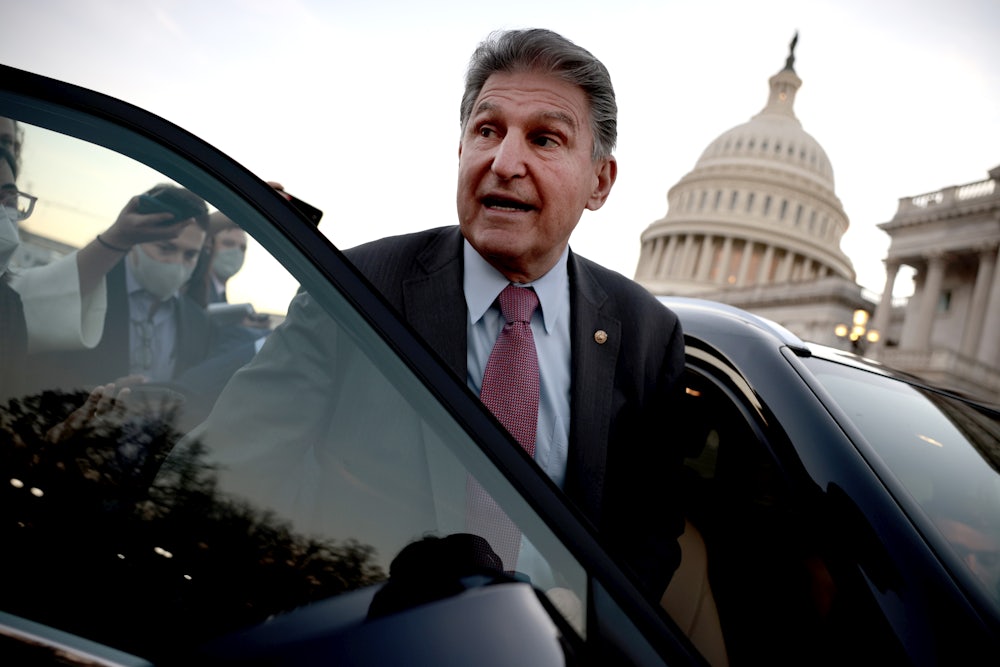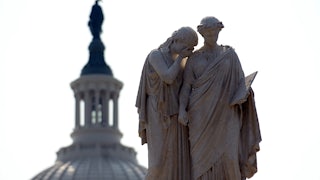Senator Joe Manchin played the Grinch to President Joe Biden’s Christmas on Sunday, all but obliterating Democrats’ hopes of passing the current version of the Build Back Better Act, a roughly $2 trillion bill overhauling the social safety net, health care system, and climate and tax policy.
“If I can’t go home and explain it to the people of West Virginia, I can’t vote for it. And I cannot vote to continue with this piece of legislation,” Manchin said in an interview on Fox News Sunday after weeks of lengthy negotiations with the White House and his fellow Democrats. “I’ve tried everything humanly possible. I can’t get there. This is a no on this piece of legislation.”
Manchin had engaged in conversations with the White House for weeks in an effort to reach an agreement on the bill, which passed in the House in November. The bill was already expected to be changed in the Senate due to parliamentary issues and disagreements over certain provisions, such as a cap on the state and local tax deduction. But Manchin essentially holds sole power over the future of the legislation. Democrats had hoped to pass the Build Back Better Act using the reconciliation process, which allows legislation to be approved in the Senate with only a simple majority—but every Democrat in the Senate had to be on board.
In a lengthy statement released after the interview, Manchin cited concerns about the ballooning national debt, questioning how it would affect the omicron variant of Covid-19 and rising tensions with China and Russia. “Our ability to quickly and effectively respond to these pending threats would be drastically hindered by our rising debt,” Manchin said. The national debt has reached nearly $30 trillion, and Democrats voted last week to raise the nation’s borrowing cap by another $2.5 trillion.
Although negotiations over the Build Back Better Act appeared to stall last week, Biden had signaled optimism in a statement on Thursday, pledging that he would continue negotiations with Manchin. “We will advance this work together over the days and weeks ahead; Leader Schumer and I are determined to see the bill successfully on the floor as early as possible,” Biden said, referring to Senate Majority Leader Chuck Schumer.
On Sunday, White House Press Secretary Jen Psaki slammed Manchin in a statement saying that “Manchin’s comments this morning on FOX are at odds with his discussions this week with the President, with White House staff, and with his own public utterances.” She added, “If his comments on FOX and written statement indicate an end to that effort, they represent a sudden and inexplicable reversal in his position, and a breach of his commitments to the President and the Senator’s colleagues in the House and Senate.”
It is unclear whether the Senate will still vote on the Build Back Better Act when it returns in the new year. Senator Bernie Sanders said in an interview with CNN’s State of the Union on Sunday morning that he “absolutely” wanted to see a vote on the legislation despite potential opposition from Manchin. “If he doesn’t have the courage to do the right thing for the working families of West Virginia and America, let him vote no in front of the whole world,” Sanders said of Manchin.
Sanders slammed Manchin in a statement released later on Sunday morning for being willing to support defense spending but not the Build Back Better Act. “I also find it amusing that Senator Manchin indicates his worry about the deficit after voting just this week for a military budget of $778 billion, four times greater than Build Back Better over ten years and $25 billion more than the president requested,” Sanders said.
Manchin’s announcement is a particular blow to Biden, who billed the Build Back Better Act as the second half of his legislative agenda, after the passage of a bipartisan bill which focused on the country’s crumbling physical infrastructure. The bipartisan bill was a priority for Manchin, and progressives in Congress worried that once it was approved, they would lose all leverage in getting the Build Back Better Act to pass.
The bipartisan bill passed in the House in November, with Democratic leadership rallying most of their members to vote for the measure with the promise that the Build Back Better Act would also get support from moderates in both chambers. Only six progressive Democrats voted against the bipartisan bill, owing to skepticism about Manchin’s willingness to support the Build Back Better Act—skepticism that now appears to have been justified.
Representative Cori Bush, one of the six left-wingers to vote against the bipartisan bill, said on MSNBC on Sunday morning that Manchin’s decision was “not a huge surprise” and that she was part of a group that had been “saying for weeks” that this would happen. Representative Pramila Jayapal, who is chair of the Congressional Progressive Caucus but voted for the bipartisan bill, said in a statement on Sunday, “Senator Joe Manchin made a promise to President Biden to support a framework that would help lower health care costs, cap the price of insulin and other prescription drugs, lower child care costs for Americans, address the climate crisis, and give working people and poor people a shot in America. Today, Senator Manchin has betrayed his commitment not only to the President and Democrats in Congress, but most importantly, to the American people. He routinely touts that he is a man of his word, but he can no longer say that.”
There were a few time-sensitive issues that Democrats had hoped to address by passing the Build Back Better Act as soon as possible. But with the Senate not voting on the bill until it returns to Washington in January, if it votes on the bill at all, this means the expanded child tax credit will expire at the end of the month. The credit, which had been enhanced by a March coronavirus relief measure, had been disbursed in monthly installments at a greater value. It also, for the first time, reached Americans too poor to file income taxes, who will now stop receiving the assistance in January. The program provided payments to more than 35 million American families with children and was expected to lift millions of children out of poverty. (Another provision in the House-passed Build Back Better Act was a four-year extension of a tax that funds a program to aid veteran coal miners disabled with black lung disease, which directly affects Manchin’s state of West Virginia.)
Manchin had long been skeptical of the child tax credit, which was extended for a year in the House version of the Build Back Better Act. In recent weeks, Manchin raised concerns that the credit, if extended for 10 years, would cost roughly $1.5 trillion, and accused his colleagues of using budgetary gimmicks to make the cost of the bill appear lower. A Congressional Budget Office score requested by Republicans found that the Build Back Better Act would increase the deficit by $3 trillion over 10 years, although Democrats argued that this did not take revenue raisers into account. (Tax cuts approved by Republicans in 2017 added $2 trillion to the deficit.)
Provisions in the House-passed Build Back Better Act include an expansion of Medicare to include hearing benefits, provisions to create universal, free pre-kindergarten and lower childcare costs, and new credits and incentives to combat climate change. It was funded by several tax changes, including a new 15 percent corporate minimum tax on large corporations, a tax surcharge targeting the wealthiest Americans, and increased funding for IRS enforcement.
Although Manchin’s comments are the death knell for the current form of the Build Back Better Act, they do not necessarily preclude further action on some of Biden’s key priorities. It’s possible that Democrats may attempt to pass fewer programs over a shorter period of time, a proposal that is supported by some moderates in the House. But this would require sticking to a smaller price tag that would be acceptable to Manchin, and excising programs that he dislikes.
“I will continue working with my colleagues on both sides of the aisle to address the needs of all Americans and do so in a way that does not risk our nation’s independence, security, and way of life,” Manchin said in his statement, indicating that further negotiations are possible. In her statement, Psaki said, “Just as Senator Manchin reversed his position on Build Back Better this morning, we will continue to press him to see if he will reverse his position yet again, to honor his prior commitments and be true to his word.”








